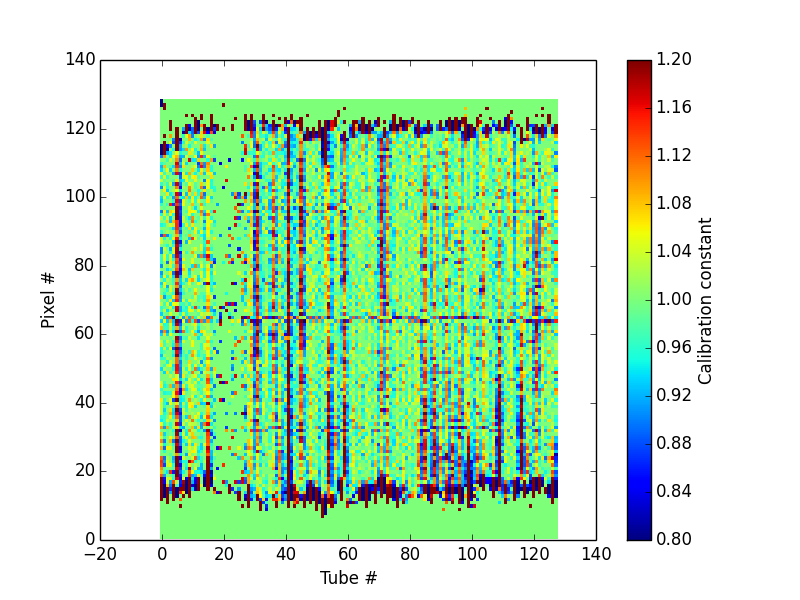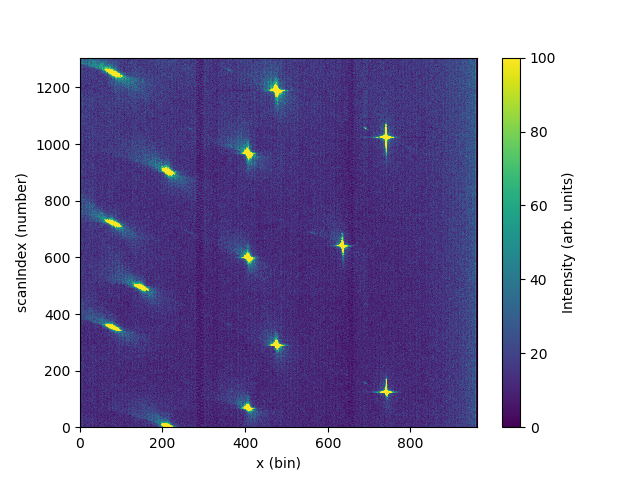\(\renewcommand\AA{\unicode{x212B}}\)
Diffraction Changes¶
Powder Diffraction¶
New¶

D2B calibration constants generated from PowderDiffILLDetEffCorr.¶
LoadILLDiffraction is extended to apply vertical and horizontal tube alignment for D2B, based on the IPF.
LoadILLDiffraction is modified to comply with the U-shape convention for tube numbering for D2B.
PowderDiffILLDetEffCorr is extended to compute the detector efficiencies also for the 2-dimensional scanning diffractometer D2B at the ILL.
PowderDiffILLDetEffCorr is extended to provide automatic masking of the pixels with spurious calibration constants.
PowderDiffILLDetEffCorr will now ignore the last scan point data, if some of the input files have 26 points, instead of 25.
PowderDiffILLDetScanReduction is extended to provide initial masking of the top and bottom parts of the tubes, and final masking of the 2D outputs.
WANDPowderReduction performs powder diffraction data reduction for WAND² with calibration, monitor normalisation and background subtraction.
New NOMAD instrument geometry for 2018 run cycle
New POWGEN instrument geometry for 2018 run cycle
New SNAP instrument geometry for 2018 run cycle with configuration for live data
Improvements¶
Changing settings while running methods on the PEARL object no longer updates the default settings. Instead, initial settings are taken as the default, and any changes are reverted back to the default once the line they were made on has finished executing
Focusing in texture-mode (160 banks) was enabled for GEM. The output is saved to several formats:
The three-column
.gemformatThe
.maudcalibration file format, for conversion to d-spacing (uses a new algorithm SaveGEMMAUDParamFile
PDCalibration has major upgrades including making use of FitPeaks for the individual peak fitting
StripPeaks has been adjusted to allow for removing peaks that have only 3 bins across them (decreased from 5 bins)
AlignAndFocusPowder had a bug when binning in time-of-flight without using a property manager to specify the time-of-flight range. In other words: characterization files are no longer necessary.
Engineering Diffraction¶
Improvements¶
Improvements to the GSAS tab:
GSASIIRefineFitPeaks is now run asynchronously in the GUI, so the tab no longer locks when a refinement is run
A Refine All button was added to run refinement on every run loaded into the tab
GSASIIRefineFitPeaks now supports Pawley refinement as well as Rietveld
HDF5 is now the standard format for saving data from the GUI:
Single peak fitting output is now saved as HDF5 instead of CSV, using EnggSaveSinglePeakFitResultsToHDF5. The algorithm previously used for saving to CSV, SaveDiffFittingAscii, has been deprecated
Fit results and parameters are saved to HDF5 from the GSAS Refinement tab using EnggSaveGSASIIFitResultsToHDF5
After focusing, workspace sample logs are saved to HDF5 using ExportSampleLogsToHDF5
The
.nxsfile from the Focus tab is now saved in the Focus directory with all the other focus output
Single Crystal Diffraction¶
New¶

Integrated output from LoadWANDSCD LoadDNSSCD¶
New algorithm LoadDNSSCD to load multiple single crystal diffraction data files from the DNS instrument into MDEventWorkspace.
New algorithms LoadWANDSCD and ConvertWANDSCDtoQ to load single crystal HB2C data and convert it to either Q-sample or HKL space.
New algorithm IntegratePeaksProfileFitting to integrate peaks using 3D profile fitting in reciprocal space.
New algorithm FindSatellitePeaks to predict the location of fractional satellite peaks using a set of nuclear peaks and a set of seed satellite peaks.
New algorithm IndexSatellitePeaks to index satellite peaks found using the FindSatellitePeaks algorithm.
SaveLauenorm now has input options for crystal system and reflection condition for lscale output instead of trying to determine from lattice parameters.
New TOPAZ instrument geometry for 2018 run cycle
Improvements¶
CreatePeaksWorkspace now accepts MD workspaces as input.
PeaksWorkspace has column added for the unique peak number so peaks can be found after sorting or filtering.
StatisticsOfPeaksWorkspace has option to use a weighted Z score for determining which peaks are outliers and has a new output workspace for plotting intensities of equivalent peaks.
